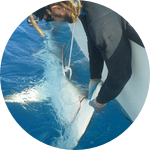Please wait...
About This Project
We will acoustically tag bonnethead sharks in a South Carolina estuary to investigate space use and determine if the introduction of offshore wind farms could cause environmental displacement from this area. Our work will ensure that the sustainable energy from offshore wind farms will not adversely affect the marine environment. The bonnethead is being used as a model species and the findings will be used for protecting all coastal sharks, the marine ecosystem, and provided ecosystem services.

Browse Other Projects on Experiment
Related Projects
Satellite tracking the secret lives of vulnerable juvenile Loggerhead sea turtles off Morocco’s Coast
This pioneer project marks the first time in Morocco's history for satellite transmitters deployed on sea...
Out for blood: Hemoparasites in white-tailed deer from the Shenandoah Valley in Northern Virginia
Our research question centers about the prevalence and diversity of hemoparasites that infect ungulate poplulations...
Cyanova: A modular, budget photobioreactor for the efficient cultivation of microalgae
Microalgae are overlooked constantly as a protein source because of it's high costs and complex maintenance...




